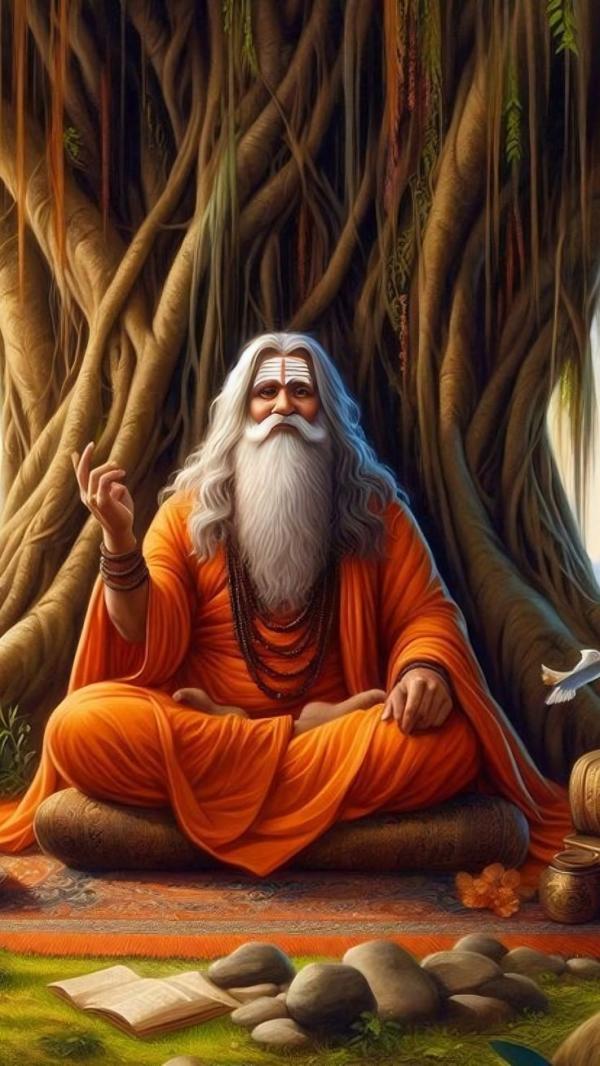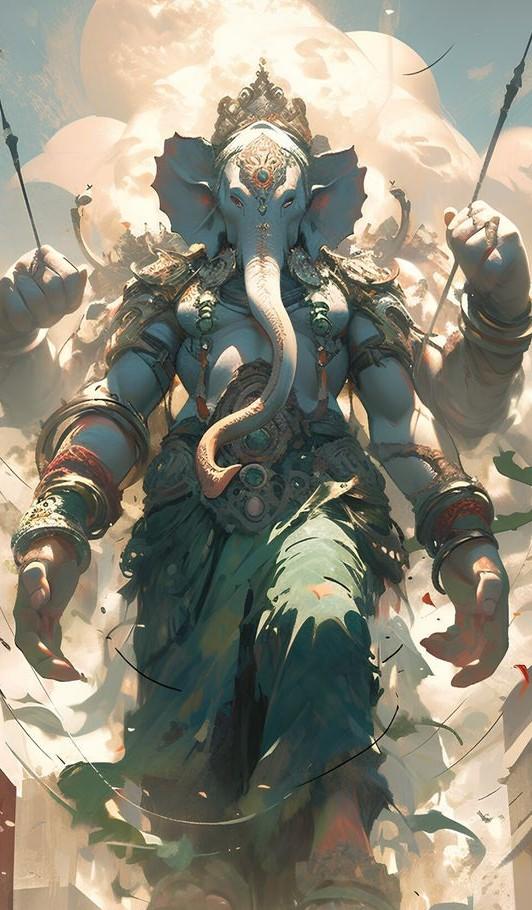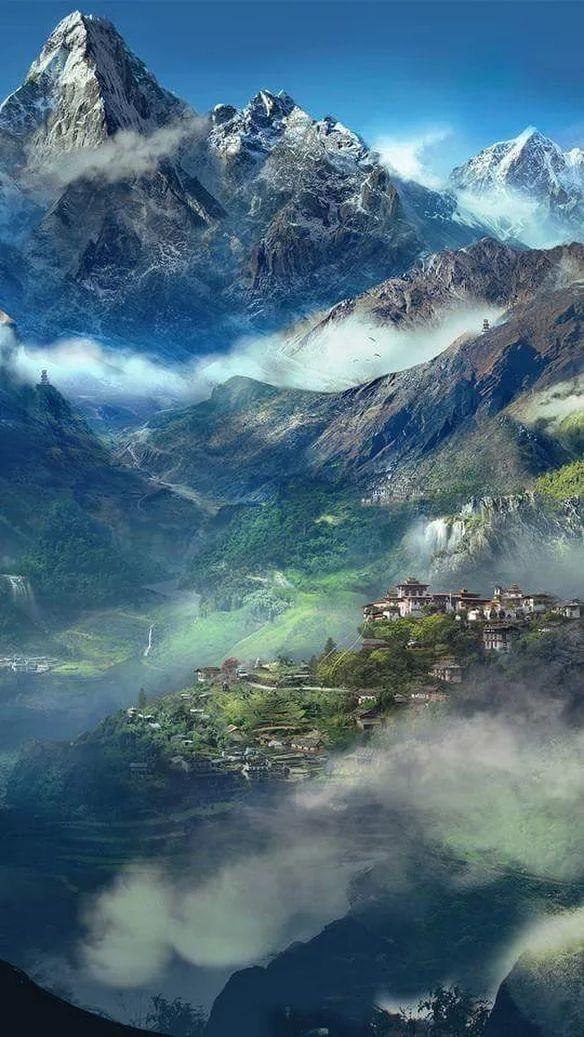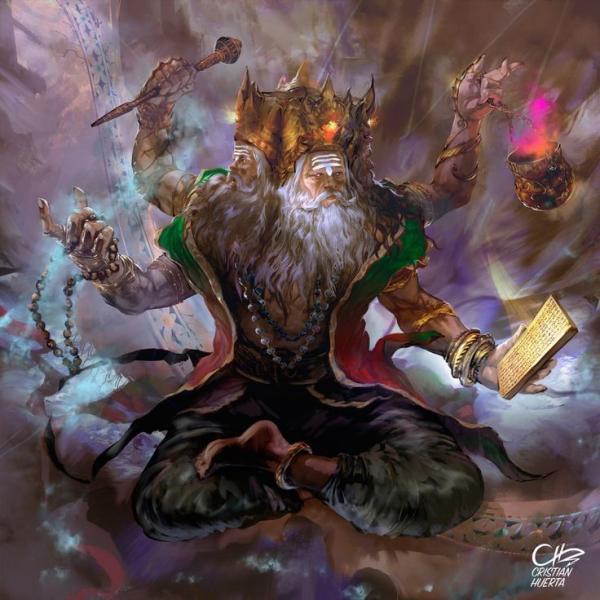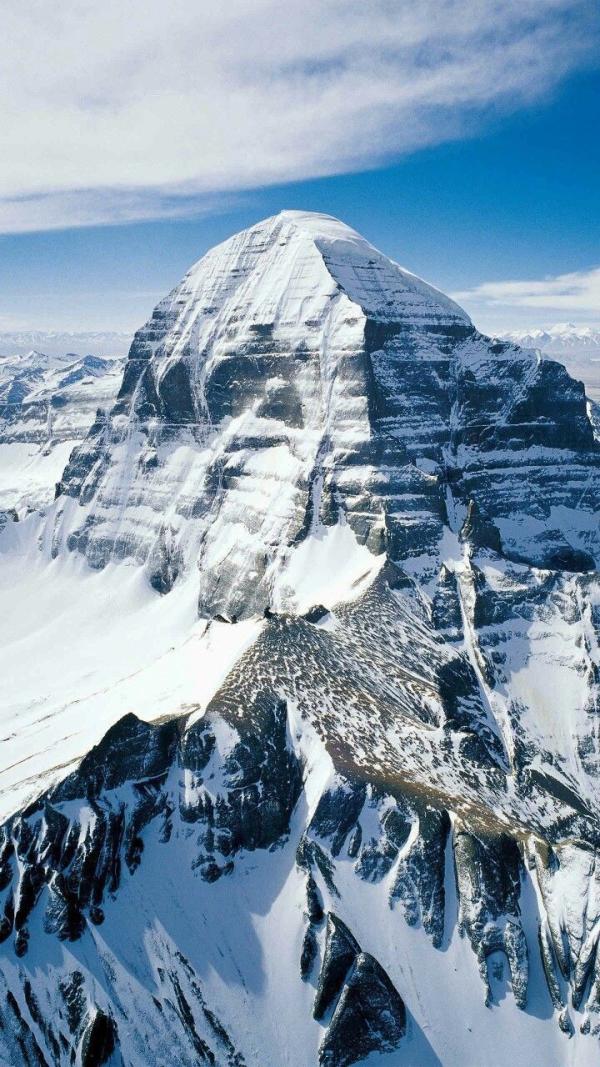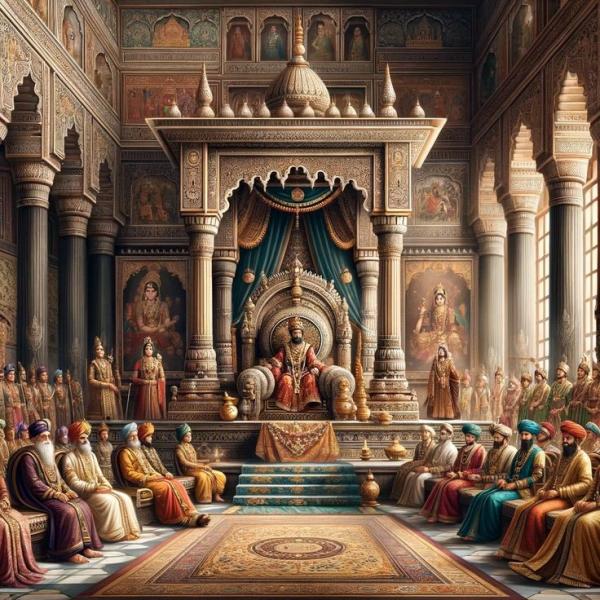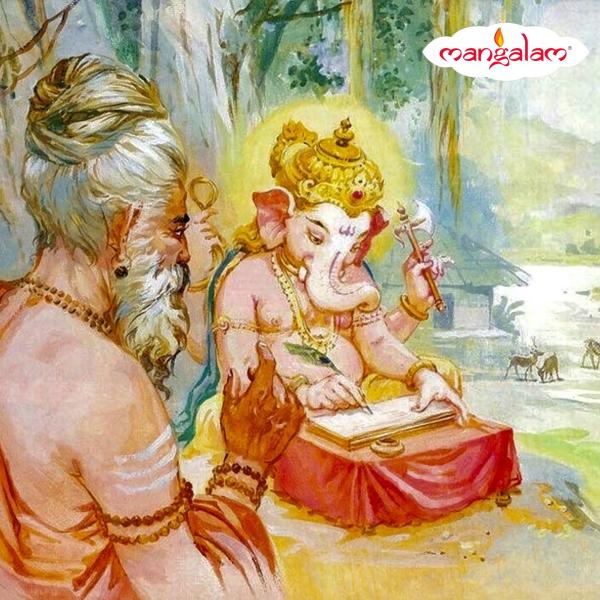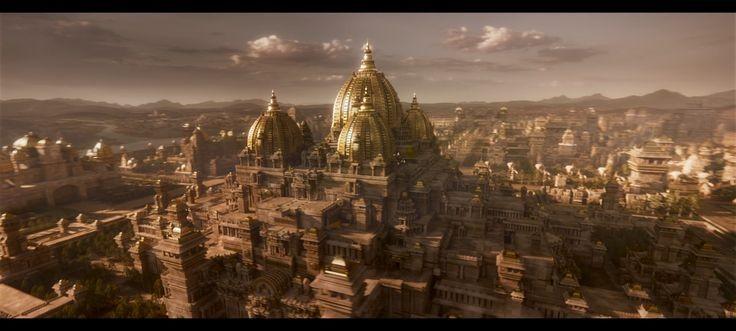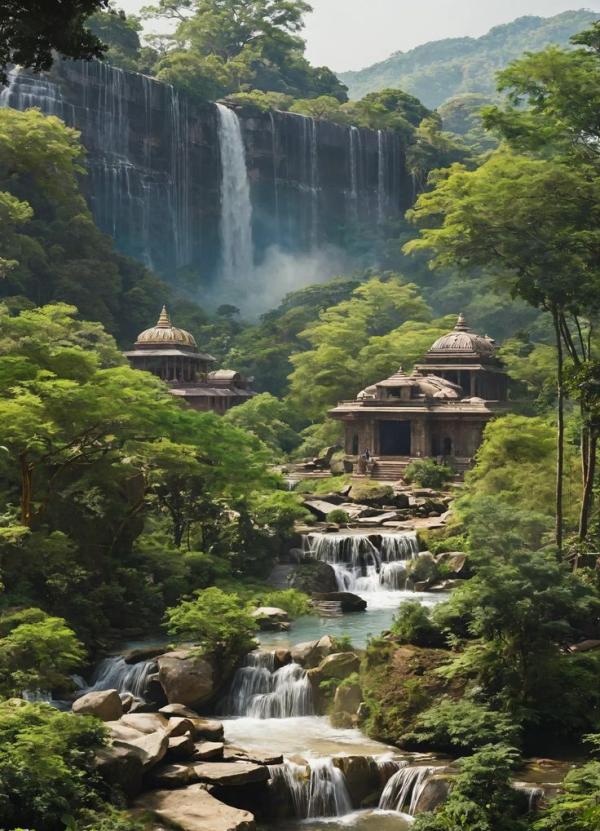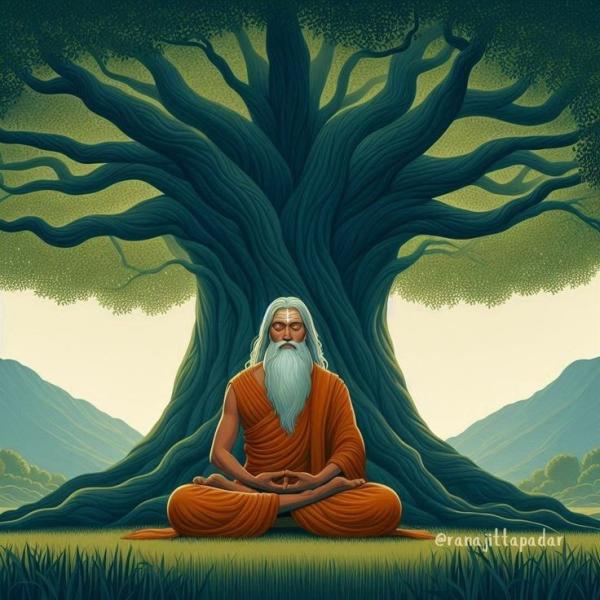Mahabharat : The Ancient History
Chapter 1: The Beginning Of Mahabharata
Sage Vyasa : A man with exceptional intellect, a deep understanding of spirituality, and a powerful ability to convey complex philosophical concepts through storytelling, often acting as a guiding force for other characters in the epics due to his vast knowledge and detached perspective.
Lord Ganesha : The God of Wisdom and Knowledge, elephant-headed and radiant, embodies wisdom and power. His presence commands reverence, his gaze holds ancient knowledge. He is the remover of obstacles, the lord of beginnings, a force both gentle and formidable.
Himalayas : Sage Vyasa's heritage
The air is crisp in the quiet of the Himalayas. A small ashram (hermitage) stands on the banks of a serene river. Inside, Sage Vyasa sits in deep meditation, his eyes closed, his breathing steady. The wind hums softly through the trees, carrying the scent of wildflowers. Suddenly, a divine voice echoes across the mountains.
Voices Of Gods
Vyasa, O great sage, awaken! Your destiny calls upon you. The time has come to compose the greatest epic, the Mahabharata.
Vyasa slowly opens his eyes, his face calm but his mind alert. He folds his hands in reverence, looking toward the heavens.
Sage Vyasa
The Mahabharata… a tale so vast, so filled with dharma and adharma, war and peace, love and betrayal… It must be written without error. But who shall be my scribe?
A golden glow fills the ashram, and in an instant, Lord Brahma, the creator of the universe, descends from the heavens. His four faces shine with divine wisdom. Vyasa immediately rises and bows respectfully.
Sage Vyasa
O Lord Brahma, your arrival is most auspicious. You know the depth of my thoughts. I have been tasked with narrating this great tale, but who will write it?
Lord Brahma
(smiling) Vyasa, your concerns are justified. The Mahabharata is no ordinary story—it is the story of kings and sages, of righteousness and destruction. It shall be a guide for future generations. But worry not, for I bring you the answer. Seek the aid of Lord Ganesha, the remover of obstacles. He alone can match your speed of thought.
Sage Vyasa
(thoughtful) Ganesha… the most intelligent among the gods. Yes, he is the only one who can undertake this task. But will he agree?
Lord Brahma
You must ask him yourself, O Vyasa. Go now, and let destiny take its course.
With those words, Brahma disappears, leaving behind a trail of golden light. Vyasa closes his eyes and chants a sacred mantra. Instantly, he is transported to Mount Kailash, the abode of Lord Shiva. The towering snow-capped peaks glisten under the sunlight, and the sound of the sacred river flows in the distance.
At Mount Kailash, under a massive banyan tree, Lord Ganesha sits in deep thought, his trunk gently swaying. His large ears twitch as he listens to the sounds of the universe. As Vyasa approaches, Ganesha opens his eyes, his gaze warm yet sharp.
Shree Ganesha
Ah, Sage Vyasa! What brings you to my humble abode?
Sage Vyasa
(smiling) O Lord Ganesha, your wisdom is unmatched, and your intellect is beyond comprehension. I have come to seek your aid in a task that only you can fulfill.
Shree Ganesha
(grinning) You flatter me, O Sage. Tell me, what is this task that requires my wisdom?
Sage Vyasa
I have been chosen to narrate the story of the Mahabharata—a tale so grand that it encompasses all aspects of life.
Shree Ganesha
Oh! That's great, and how do you require my help in this?
Sage Vyasa
But it must be written with precision and speed. No ordinary scribe can match the pace of my thoughts. Will you, O Vighnaharta, be my writer?
Ganesha strokes his trunk, pretending to ponder. His eyes gleam with mischief.
Shree Ganesha
Hmm… A great honor indeed! But I am not one to accept a task without a challenge. So, I shall agree—but on one condition.
Sage Vyasa
(curious) What is your condition, O Lord?
Shree Ganesha
You must not pause in your narration. If you stop, even for a moment, I shall cease writing.
Vyasa strokes his beard, a knowing smile forming on his lips. He has anticipated such a challenge.
Sage Vyasa
A clever condition, indeed! But I, too, have a condition for you, O Ganapati.
Shree Ganesha
(raising an eyebrow) "Oh? And what might that be?"
Sage Vyasa
You must understand every word before you write it down.
Ganesha chuckles, his tusks gleaming in the sunlight.
Shree Ganesha
Ah! So you wish to slow me down! Well played, O Sage. Very well, I accept your condition. But beware—you must think quickly, for I shall not wait for long.
Sage Vyasa
(nodding) Let it be so. We shall begin.
Ganesha breaks a sharp piece of his own tusk and holds it ready to write. Vyasa closes his eyes, takes a deep breath, and begins his narration. His voice is steady and powerful.
Sage Vyasa
Narayana Namaskritya… (I bow to Narayana, the Supreme Being…)
Ganesha’s tusk moves swiftly, inscribing the words onto sacred palm leaves. The greatest epic of all time begins, with the divine sage narrating and the god of wisdom writing. Thus, The Epic Mahabharata is born.
Author
Note : Some words in this story are pure sanskrit and some names of Gods.
Author
I hope you all like it.
Author
Do recommend suggestions or improvement for anything regarding the story.
Chapter 2: Invocation and Origin of The Epic
The rustling of palm leaves fills the air as Lord Ganesha inscribes Vyasa’s words with swift precision. The sage sits cross-legged, his voice steady, while Ganesha’s tusk moves without pause. The sacred task has begun.
Sage Vyasa
This is not just a story of kings and battles, of righteousness and betrayal.
Sage Vyasa
It is the very essence of dharma, the guide for generations to come. Before I begin the tale, I must invoke the divine.
Vyasa closes his eyes and recites a prayer.
Sage Vyasa
"Narayana Namaskritya, Naram chaiva Narottamam,
Deviim Saraswatiim chaiva, tato jayam udiirayet."
I. e. "I bow to Narayana, the Supreme Lord, to Nara, the noblest of men, and to the goddess Saraswati. May victory be spoken of!"
Ganesha pauses momentarily before writing, ensuring he fully understands the invocation. He then continues inscribing, nodding in approval.
Shree Ganesha
A grand beginning, O Sage. But tell me, how did this tale come to be? Who first heard it?
Sage Vyasa
The story was first recited in the court of the great King Janamejaya, the son of King Parikshit, who was the grandson of Arjuna.
Shree Ganesha
(intrigued) And why did Janamejaya wish to hear this tale?
Vyasa strokes his beard, his eyes filled with ancient wisdom.
Sage Vyasa
That is a tale in itself, O Ganapati. Listen closely.
Scene: The Court of King Janamejaya
The grand court of Hastinapura is filled with noblemen, sages, and ministers. King Janamejaya, seated on a golden throne, looks toward a venerable sage standing before him—Sage Vaishampayana, a disciple of Vyasa.
King Janamejaya
O Sage Vaishampayana, I have heard that my ancestors, the Kuru princes, fought in a great war. But many tales are told, and I seek the true account. Speak to me of the deeds of my forefathers. Tell me of the great war, the Kurukshetra battle, and of my noble grandfather, Parikshit.
Vaishampayana bows before the king, his expression solemn.
Sage Vaishampayana
O King, the tale you seek is vast, filled with wisdom, heroism, and sorrow. It was composed by the great Sage Vyasa and recorded by Lord Ganesha himself. Listen with patience, for this is the story of the Mahabharata.
The court falls silent as Vaishampayana begins his recitation.
Sage Vaishampayana
Long ago, in the golden age, there lived a great king named Shantanu, of the Kuru dynasty. His reign was peaceful and just. But fate had plans that would change the destiny of the world…
The court listens in rapt attention as the story unfolds.
Now back to Sage Vyasa's hermitage
Ganesha, still inscribing with his tusk, glances at Vyasa.
Shree Ganesha
So this tale was first heard in the court of Janamejaya? But what of his father, Parikshit? You mentioned his name—what happened to him?
Sage Vyasa
(nods) Ah, Parikshit… The noble son of Abhimanyu. His fate was intertwined with destiny. Shall I tell you his story next?
Shree Ganesha
(grinning) I must understand before I write, must I not? Proceed, O Sage.
Vyasa takes a deep breath, preparing to recount another tale—one that would lead to the very reason Janamejaya sought this epic.
Chapter 3: The Curse of King Parikshit
The sound of scratching fills the air as Ganesha continues inscribing Vyasa’s words. The sage’s voice remains steady, his eyes filled with deep wisdom.
Shree Ganesha
You spoke of King Parikshit, the father of Janamejaya. What was his fate? Why did Janamejaya seek to know his ancestors' story?
Sage Vyasa
Ah, Parikshit… A noble king, a descendant of the great Arjuna. His fate was sealed by destiny’s cruel hands. Listen, O Ganesha, and write carefully.
Ganesha’s tusk moves swiftly as Vyasa continues.
Scene: Hastinapura – The Reign of King Parikshit
The grand city of Hastinapura stands proud, its golden palace shining under the morning sun. Inside the royal court, King Parikshit sits upon his throne, surrounded by ministers and sages. He is known as a wise and just ruler, beloved by his people.
Minister
O King, the kingdom prospers under your rule. Your justice and wisdom remind us of your ancestors, the Pandavas.
King Parikshit
(smiling) Dharma must always guide a ruler, for without it, even the mightiest kingdom crumbles. But tell me, are all my people content? Does anyone suffer injustice?
Sage in Court
O King, your reign is righteous. But beware—the age of Kali has begun. Evil spreads its roots, and dharma is in decline.
Parikshit’s face darkens as he hears these words. He is determined to protect his kingdom from the corruption of Kali Yuga.
Scene: The Forest – Parikshit’s Fatal Mistake
One day, while hunting in the forest, Parikshit rides alone, his bow slung across his shoulder. The sun is high, and the forest is dense. After hours of hunting, he grows tired and thirsty.
King Parikshit
(to himself) I must find water. My throat burns, and the sun is relentless.
As he wanders deeper, he spots a small ashram nestled among the trees. Inside, a sage sits in deep meditation. It is Sage Shamika, an ascetic who has renounced worldly ties.
King Parikshit
(relieved) Surely, a sage’s ashram will have water.
He steps inside and approaches the sage, but Shamika remains unmoving, his eyes closed in deep meditation.
King Parikshit
(raising his voice) O Sage, I am King Parikshit, ruler of Hastinapura. I seek water.
The sage does not respond. Parikshit frowns, his patience waning. He speaks again, louder this time.
King Parikshit
O Great Sage, I am your guest! Will you not even acknowledge my presence?
Yet, there is no response. Anger flickers in Parikshit’s eyes. He feels insulted, believing the sage is deliberately ignoring him.
King Parikshit
(gritting his teeth) Very well! If you will not acknowledge a king, let me see if you react to this.
His eyes fall upon a dead snake lying nearby. In a moment of arrogance, he picks it up with the tip of his bow and drapes it around the sage’s neck.
Even then, Sage Shamika does not stir. But the forest seems to fall silent, as if nature itself disapproves of Parikshit’s deed.
King Parikshit
(muttering) Let us see if silence still serves you, O Sage.
He turns and leaves the ashram, but in his heart, a strange unease settles.
Scene: Sage Shamika’s Ashram – The Wrath of Shringi.
Hours pass. A young ascetic, Shringi, returns to the ashram. His eyes widen in fury as he sees his father, the revered sage, sitting motionless with a dead snake around his neck.
Sage Shringi
(shouting) Who has dared to insult my father? Who has committed this sinful act?
Tears of rage well up in his eyes as he realizes the magnitude of the insult. The air around him crackles with energy as he raises his hands in anger.
Sage Shringi
This is an insult not just to my father, but to dharma itself! Whoever has done this shall not go unpunished!
He closes his eyes, his voice trembling with divine fury.
Sage Shringi
By the power of my penance, I curse the perpetrator! Within seven days, the one who placed this serpent upon my father shall meet his death at the hands of Takshaka, the king of serpents!
A loud crack of thunder shakes the ashram, as if the heavens themselves acknowledge the curse.
Scene: Hastinapura – Parikshit Learns of His Fate
In the royal court, Parikshit sits deep in thought when a messenger rushes in, breathless.
Messenger
O King! A great curse has been placed upon you!
Parikshit’s gaze sharpens as he listens.
Messenger
Sage Shringi, the son of Shamika, has cursed you! Within seven days, Takshaka, the mighty serpent, shall take your life!
A heavy silence falls over the court. Ministers exchange anxious glances, but Parikshit remains composed. He closes his eyes for a moment, as if accepting his fate.
King Parikshit
A curse… for a moment of arrogance. I accept the consequences of my actions.
Minister
O King, we must find a way to counter this! You are the ruler of Hastinapura!
King Parikshit
No, my minister. Fate has spoken. But I shall not wait idly for death. If Takshaka must take my life, let it be within the sacred walls of meditation and knowledge.
He rises from his throne, his voice firm.
King Parikshit
Build me a chamber upon the highest tower. Let no creature, no serpent, enter its walls. I shall spend my final days in penance, seeking wisdom and peace.
The minister bows, though his heart is heavy. The king, accepting his fate, prepares for his final days.
End of this chapter here.
See you guys in the next chapter.
Thank You for reading it.
Download NovelToon APP on App Store and Google Play

